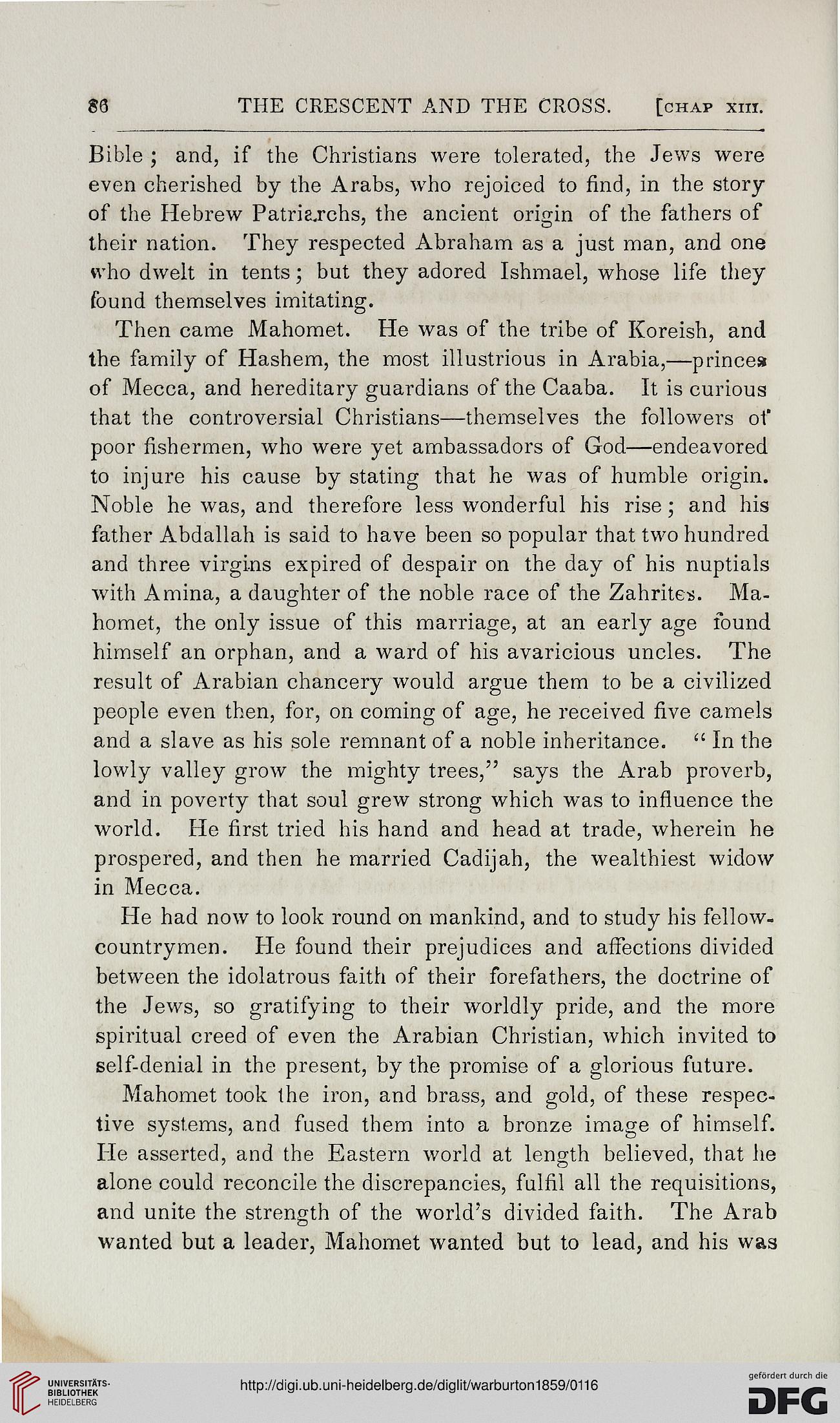THE CRESCENT AND THE CROSS. [chap xin.
Bible ; and, if the Christians were tolerated, the Jews were
even cherished by the Arabs, who rejoiced to find, in the story
of the Hebrew Patriarchs, the ancient origin of the fathers of
their nation. They respected Abraham as a just man, and one
who dwelt in tents; but they adored Ishmael, whose life they
found themselves imitating.
Then came Mahomet. He was of the tribe of Koreish, and
the family of Hashem, the most illustrious in Arabia,—princea
of Mecca, and hereditary guardians of the Caaba. It is curious
that the controversial Christians—themselves the followers of
poor fishermen, who were yet ambassadors of God—endeavored
to injure his cause by stating that he was of humble origin.
Noble he was, and therefore less wonderful his rise ; and his
father Abdallah is said to have been so popular that two hundred
and three virgins expired of despair on the day of his nuptials
with Amina, a daughter of the noble race of the Zahrites. Ma-
homet, the only issue of this marriage, at an early age found
himself an orphan, and a ward of his avaricious uncles. The
result of Arabian chancery would argue them to be a civilized
people even then, for, on coming of age, he received five camels
and a slave as his sole remnant of a noble inheritance. " In the
lowly valley grow the mighty trees," says the Arab proverb,
and in poverty that soul grew strong which was to influence the
world. He first tried his hand and head at trade, wherein he
prospered, and then he married Cadijah, the wealthiest widow
in Mecca.
He had now to look round on mankind, and to study his fellow-
countrymen. He found their prejudices and affections divided
between the idolatrous faith of their forefathers, the doctrine of
the Jews, so gratifying to their worldly pride, and the more
spiritual creed of even the Arabian Christian, which invited to
self-denial in the present, by the promise of a glorious future.
Mahomet took the iron, and brass, and gold, of these respec-
tive systems, and fused them into a bronze image of himself.
He asserted, and the Eastern world at length believed, that he
alone could reconcile the discrepancies, fulfil all the requisitions,
and unite the strength of the world's divided faith. The Arab
wanted but a leader, Mahomet wanted but to lead, and his was
Bible ; and, if the Christians were tolerated, the Jews were
even cherished by the Arabs, who rejoiced to find, in the story
of the Hebrew Patriarchs, the ancient origin of the fathers of
their nation. They respected Abraham as a just man, and one
who dwelt in tents; but they adored Ishmael, whose life they
found themselves imitating.
Then came Mahomet. He was of the tribe of Koreish, and
the family of Hashem, the most illustrious in Arabia,—princea
of Mecca, and hereditary guardians of the Caaba. It is curious
that the controversial Christians—themselves the followers of
poor fishermen, who were yet ambassadors of God—endeavored
to injure his cause by stating that he was of humble origin.
Noble he was, and therefore less wonderful his rise ; and his
father Abdallah is said to have been so popular that two hundred
and three virgins expired of despair on the day of his nuptials
with Amina, a daughter of the noble race of the Zahrites. Ma-
homet, the only issue of this marriage, at an early age found
himself an orphan, and a ward of his avaricious uncles. The
result of Arabian chancery would argue them to be a civilized
people even then, for, on coming of age, he received five camels
and a slave as his sole remnant of a noble inheritance. " In the
lowly valley grow the mighty trees," says the Arab proverb,
and in poverty that soul grew strong which was to influence the
world. He first tried his hand and head at trade, wherein he
prospered, and then he married Cadijah, the wealthiest widow
in Mecca.
He had now to look round on mankind, and to study his fellow-
countrymen. He found their prejudices and affections divided
between the idolatrous faith of their forefathers, the doctrine of
the Jews, so gratifying to their worldly pride, and the more
spiritual creed of even the Arabian Christian, which invited to
self-denial in the present, by the promise of a glorious future.
Mahomet took the iron, and brass, and gold, of these respec-
tive systems, and fused them into a bronze image of himself.
He asserted, and the Eastern world at length believed, that he
alone could reconcile the discrepancies, fulfil all the requisitions,
and unite the strength of the world's divided faith. The Arab
wanted but a leader, Mahomet wanted but to lead, and his was




